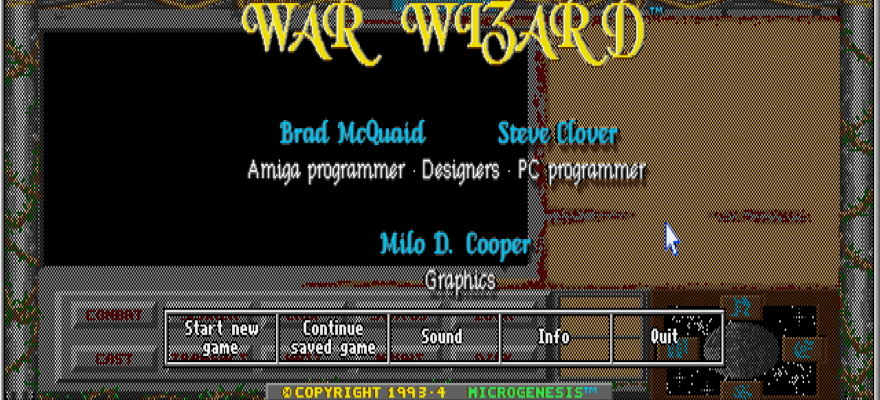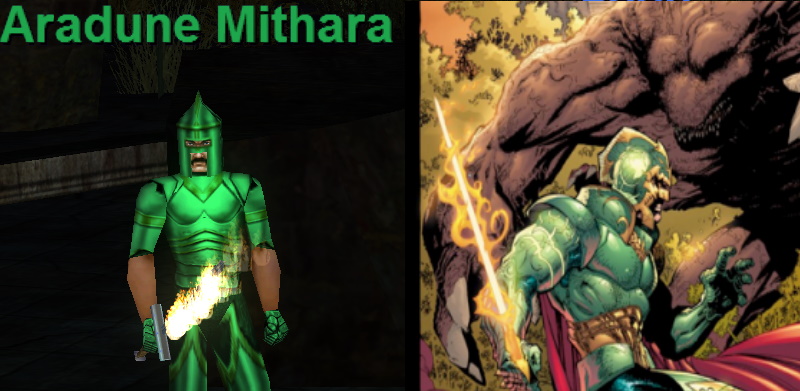
When the news hit last night, it brought everything to a screeching halt in the Massively OP office: At the age of 51, veteran MMORPG designer Brad McQuaid had died. Tied to three major fantasy games, including one still in development, McQuaid has been a significant developer in the MMO space since the mid-1990s.
Brad McQuaid was both controversial and beloved, criticized for his business failings and hardcore mentality but also venerated for his contributions to the industry and his infectious passion. Whether you loved him, hated him, or had a complex relationship with the man, you cannot deny that McQuaid’s fingerprints are all over the modern MMO genre.
Today we will be looking back at the life and work of this game designer who made the worlds that millions have played in — and perhaps millions more to come when his posthumous project comes to fruition.
Born on April 25th, 1968, Brad McQuaid grew up during the microcomputer revolution in the San Diego area. McQuaid was inspired to go into game development after he beat Richard Garriott’s Ultima II in the ’80s and found himself entranced by the thought of making virtual worlds.
To pursue this dream, he attended Palomar College from 1988 through 1992, where he both studied computer science and played soccer. During this time, McQuaid founded a game company called MicroGenesis with one of his friends, Steve Clover. The pair worked on a computer game called WarWizard, a fantasy RPG that was released in 1993 for PC and Amiga.
WarWizard might not have made the two of them millions, but it did help them get their foot in the door with Sony in 1996. Both McQuaid and Clover were hired by John Smedley to work on an ambitious new online RPG: EverQuest. This was just fine by the pair, as they had enjoyed and been inspired by text-based MUDs such as Sojourn and TorilMUD.
In fact, if there was one thing to know about Brad McQuaid, it is that he was just as much in love with MMOs — if not more so! — than anyone. “To me, a proper MMO is more than a game,” he said in a later interview. “It’s a world. I want to be immersed, I want to escape into a fantasy or sci-fi world. [MMO developers are] making the very, very early foundations of the Holodeck. Letting people recreate the 1930s or build new virtual worlds — that’s what MMOs are, they’re the genesis of that.”
McQuaid began his tenure at the studio as a lead programmer, but as the ’90s progressed and EverQuest came closer to release, he worked his way up to become a producer and lead designer on the project. His meteoric rise continued following Sony Online Entertainment’s acquisition of Verant, at which point he became Vice President of Premium Games and Chief Creative Officer.
“Not only was the MMORPG genre relatively new, but so were we,” McQuaid said in a 2012 interview. “Probably half of the team or more had never worked in the professional game industry. So we had no idea what would or wouldn’t work. We were fearless and persevered through trial and error. Other people in the online industry were skeptical as to whether we could pull it off, but we didn’t let that affect us.”
In November 2000, PC Gamer inducted McQuaid into its “New Game Gods” pantheon along with American McGee, Stevie Case, Alex Garden, Cliff Bleszinski, Ed Del Castillo, Ken Levine, and Robin Walker. At the time, McQuaid was just 31, but even then he was seen as a rising star in the blazing hot MMORPG genre.
While you may know many famous MMO developers by name, Brad McQuaid was just as well-known for his in-game avatar: Aradune Mithara. The stern warrior, wielding a flaming sword known as the Fiery Avenger and donning bright green armor, was officially added to EverQuest as an NPC that could also be controlled by McQuaid if he so desired. It was one of the nice perks of the job, especially for a designer who was also a hardcore gamer. McQuaid would often be spotted raiding with his guild Fires of Heaven, further cultivating a reputation as an all-around geek deity.
However, after six years of working on the EverQuest franchise, McQuaid felt “stretched thin” and increasingly distanced from his previous hands-on role of making games.
“I didn’t feel like I was making games anymore,” he said. “I felt like I was just checking up on the people who were actually making games. I missed that and being part of the creative process, so when I could exit gracefully, I did.”
In 2002, he founded Sigil Games and announced that he would be working on a new MMORPG called Vanguard: Saga of Heroes. With an “all-star dream team” at his back, McQuaid turned his focus to creating a next generation MMO. The idea was to take the graphical MMORPG back to its MUD roots with a slew of innovative features that would immerse people into this virtual world. At a time when World of Warcraft was skewing casual, McQuaid’s hardcore mentality took Vanguard in a more cutthroat direction.
“We’re determined to bring back the ‘magic’ most people felt when they experienced their first MMOG but to also to push the genre harder, appealing to gamers who may not have yet experienced how awesome online gaming can really be,” he said in a 2003 interview.
However, Vanguard’s development was anything but smooth. Microsoft, originally a multi-million dollar partner, pulled out of the project by 2006. Sigil turned to McQuaid’s old friends at SOE for publishing and pushed hard to get the game done by the end of the year. The expensive and incomplete game was pushed out of the door in January 2007, right alongside of World of Warcraft: The Burning Crusade. Vanguard got smoked by both the competition and its own buggy release, struggling to retain 90,000 players by the end of its initial month.
McQuaid’s predictions of Vanguard being the next big thing in MMO gaming proved far too optimistic. While SOE would gradually shape it up over the next few years, the Day One breakout hit was sadly not to be. The lowest point for Sigil Games and Brad McQuaid came in May 2007, when everyone in the studio was fired on the same day (some were later re-hired by SOE) and McQuaid was demoted from president to creative consultant.
For several years after the Sigil disaster, McQuaid floated about looking for a new purpose. He attempted a new start-up in 2010 before returning to SOE in 2012 to contribute to his old stomping grounds: Vanguard and EverQuest.
It should be noted that while Vanguard ultimately was sunsetted, it did develop a strong and loyal cult of followers who praised the game for its clever mechanics, beautiful world, and expansive adventures. If SOE had given it more time to finish development and work out the bugs, there is no telling how its launch might have gone.
And this time at SOE wasn’t poorly spent because it rejuvenated McQuaid: “I was reinvigorated. There was just this passion inside me. Man, I had to make another! I just needed to find some likeminded and experienced developers who wanted to make another game.”
McQuaid’s quiet return to SOE in 2012 was short-lived. A little over a year later in 2013, he left once more to take another stab at the type of MMO that he wanted to make. This was, of course, Pantheon: Rise of the Fallen, which has been in development for the past half-decade. There at Visionary Realms, McQuaid and his loyal team initially struggled through crowdfunding issues, an ever-shifting market, and design decisions to forge another virtual world for him and his followers to enjoy together.
Described as a “classic take on epic MMO adventure,” Pantheon promised to be a challenging and rewarding title that would return to what made MMORPGs great in the first place. The laundry list of ideas that accompanied the original pitch undoubtedly reminded McQuaid’s followers of Vanguard’s lengthy feature sheet.
During the past five years, an interesting phenomenon has occurred. Through hard work, dogged persistence, and his trademark passion for a clear vision, McQuaid’s reputation began to ascend after a long time in the valley of public opinion. Gamers – and investors – went from looking at Pantheon with dubious eyes to calling it one of the most anticipated MMOs currently in development.
No matter what you think of Brad McQuaid, the man built expansive and well-loved worlds that many enjoy today. His passing has greatly affected many players who cut their teeth on EverQuest or Vanguard, and there is little doubt that the team he left behind at Visionary Realms will do their absolute best to make Pantheon a living testament to McQuaid’s life.
This quote about EverQuest seems to sum up Brad McQuaid’s entire approach to MMO creation: “I think the big ambition was to make a game we could be proud of, that we would enjoy playing, and where hopefully there were enough other people out there that would feel the same way.”
 Believe it or not, MMOs did exist prior to World of Warcraft! Every two weeks, The Game Archaeologist looks back at classic online games and their history to learn a thing or two about where the industry came from… and where it might be heading.
Believe it or not, MMOs did exist prior to World of Warcraft! Every two weeks, The Game Archaeologist looks back at classic online games and their history to learn a thing or two about where the industry came from… and where it might be heading.


















